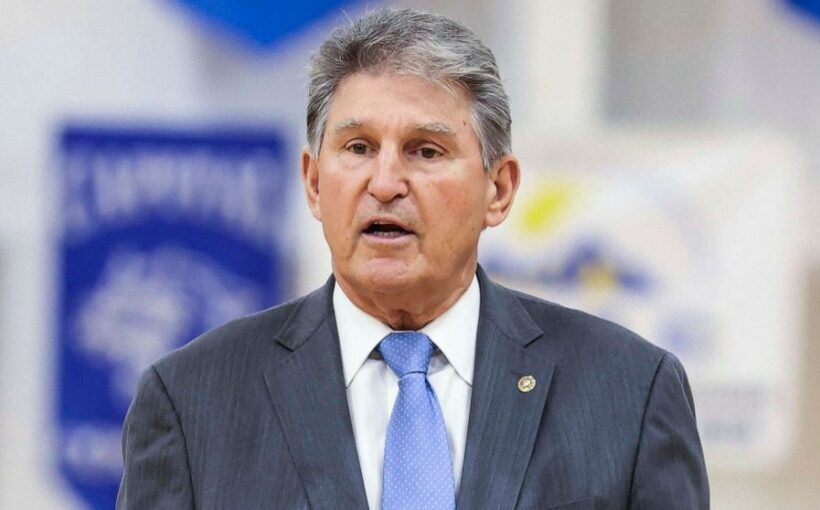Sen. Joe Manchin, D-W.Va., on Tuesday sat down for an hour-long virtual meeting with Black civil rights leaders about voting rights and Senate rules, just days after he reiterated his opposition to a sweeping Democratic proposal to federalize voting rights.
While he called the meeting with the leaders of half a dozen civil rights organizations a “constructive conversation,” Manchin appeared unmoved by their appeals to reconsider his opposition to the For the People Act or altering the Senate’s rules to allow legislation to advance with a simple majority of the chamber.
“I don’t think anybody changed positions on that. We’re just learning where everybody’s coming from,” he said.
On Sunday, in an op-ed in the Charleston Gazette Mail, Manchin argued that “partisan voting legislation will destroy the already weakening binds of our democracy,” dashing the hopes of Democrats and advocates who hoped the party’s 50-seat Senate majority could unite around the House-passed package to respond to concerns about changes to voting laws in GOP-led states after the 2020 election.
Manchin is not the only Democrat against changing the Senate legislative filibuster rules, but he is the lone Democrat to publicly oppose the For the People Act and has not signaled any specific policy issues with the legislation. He says he is opposed to it because it lacks bipartisan support, which he considers a necessary component for voting reforms — even though he endorsed an earlier version of the bill in 2019, when it lacked GOP cosponsors.
Although Manchin expressed support for a narrower voting rights measure named for the late Rep. John Lewis that would restore pieces of the Voting Rights Act of 1965 recently struck down by the Supreme Court — including the requirement that some states and other jurisdictions receive approval for any voting changes — Senate Minority Leader Mitch McConnell announced his opposition to the measure, suggesting it lacked the 10 GOP votes needed to advance through the chamber.
During Tuesday morning’s meeting, civil rights leaders spoke at length with Manchin about the need to protect the right to vote — and the state-level changes to voting taking place in Republican-controlled states across the country.
“We had a candid conversation, we disagreed on certain things that were talked about but we’re going to have a further conversation with him,” National Urban League CEO and President Marc Morial told ABC News. “I think we gave him some important things to consider and think about.”
In an interview on ABC News Live’s “The Breakdown,” NAACP President Derrick Johnson said the goal of the meeting was to ultimately establish a relationship with Manchin to find solutions to protect voting rights.
“It was a pleasant meeting. We left the meeting agreeing that there will be more follow up so we can figure out the best way forward,” Johnson said.
“The commitment is to begin the process to ensure we protect the rights of citizens to vote. Legitimate voters should be able to participate, free from voter suppression oppression methods. Senator Manchin, when he was the secretary of state, he did that. He expanded access to voting, and we’re only asking him to work with the community, identify other senators so we can do the same for the American people,” Johnson added.
According to the Rev. Al Sharpton, president and CEO of the National Action Network, participants described the importance of the voting reforms in the bill named after Lewis, which Manchin said he would support, and the larger package of reforms that would federalize election laws but is opposed by Republicans. The group of Black leaders also urged Manchin to reconsider his defense of the filibuster — which is why the elections legislation will need 60 votes to pass — given its “racist” history, Sharpton recalled.
“I was disappointed we couldn’t convince him to change his mind at this point. I wouldn’t say it was not successful because we just had the meeting, but he just wouldn’t say if he would change his mind,” Sharpton told ABC News, adding that he feels hopeful about plans to have an ongoing conversation around voting rights and police reform.
“This has more to do with his views about the way the Senate operates than the substance of these bills,” Morial said. “Our view is that the substance is more important than the procedure.”
Manchin also did not share his position on the police reform proposals under negotiation between House and Senate Democrats and Republicans, citing the sensitivity of those talks, according to Morial.
Senate Majority Leader Chuck Schumer, D-N.Y., said on Tuesday that the Senate will still vote on the House-passed For The People Act at the end of June and that the caucus is in discussions with Manchin over potential changes to the bill.
ABC News’ Trish Turner and Rachel Scott contributed to this report.
Source: Read Full Article
